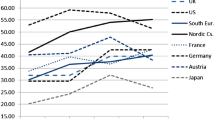Abstract
A switch from the current destination-based value-added taxation to an origin-based consumption tax will not be neutral in a world economy with international capital mobility and overlapping generations. This paper evaluates the macroeconomic and welfare effects of such a multilateral reform in a two-region, intertemporal general equilibrium model. The analysis isolates and quantifies income effects due to changes in generations' tax burdens, factor price repercussions and initial asset price adjustments, as well as efficiency effects that arise from endogenous labor supply and short run savings responses in a numerical simulation exercise.
Similar content being viewed by others
References
Auerbach, A. J., and L. J. Kotlikoff. (1987). Dynamic Fiscal Policy. Cambridge: Cambridge University Press.
Berglas, E. (1981). “Harmonisation of Commodity Taxes.” Journal of Public Economics 16, 377-387.
Bovenberg, L. A. (1994). “Destination-and Origin-Based Taxation Under International Capital Mobility.” International Tax and Public Finance 1, 247-273.
Commission of the European Communities. (1996). A Common System of VAT: A Programme for the Single Market. COM 328 (96) final. Brussels.
Fehr, H., and L. J. Kotlikoff. (1996). “Generational Accounting in General Equilibrium.” Finanzarchiv 53, 1-27.
Fehr, H., C. Rosenberg, and W. Wiegard. (1995). Welfare Effects of Value-Added Tax Harmonization in Europe. Berlin: Springer.
Frenkel, J. A., A. Razin, and S. Symansky. (1991). “International VAT Harmonization.” IMF Staff Papers 38, 789-827.
Genser, B., A. Haufler, and P. B. Sørensen. (1995). “Indirect Taxation in an Integrated Europe: Is There a Way to Avoid Trade Distortions without Sacrificing National Tax Autonomy?” Journal of Economic Integration 10, 178-205.
Gravelle, J. G. (1991). “Income, Consumption and Wage Taxation in a Life-Cycle Model: Separating Efficiency from Redistribution.” American Economic Review 81, 985-995.
Haufler, A., and S. B. Nielsen. (1997). “Dynamic Effects of an Anticipated Switch from Destination-to Origin-Based Commodity Taxation.” Journal of Economics 66, 43-69.
Hayashi, F. (1982). “Tobin's Marginal q and Average q: A Neoclassical Interpretation.” Econometrica 50, 213-224.
Keen, M., and S. Smith. (1996). “The Future of Value Added Tax in the European Union.” Economic Policy 23, 375-420.
Keuschnigg, C. (1991). “The Transition to a Cash Flow Income Tax.” Swiss Journal of Economics and Statistics 127, 113-140.
Keuschnigg, C. (1994). “Dynamic Tax Incidence and Intergenerationally Neutral Reform.” European Economic Review 38, 343-366.
Lockwood, B., D. de Meza, and G. D. Myles. (1994). “When Are Origin and Destination Regimes Equivalent?” International Tax and Public Finance 1, 5-24.
Lockwood, B., D. de Meza, and G. D. Myles. (1995). “On the European Union VAT Proposals: The Superiority of Origin over Destination Taxation.” Fiscal Studies 16, 1-17.
Summers, L. H. (1981). “Taxation and Corporate Investment: A q-Theory Approach.” Brookings Papers on Economic Activity 1, 67-127.
Thalmann, P., L. H. Goulder, and F. Delrome. (1996). “Assessing the International Spillover Effects of Capital Income Taxation.” International Tax and Public Finance 3, 449-478.
Whalley, J. (1979). “Uniform Domestic Tax Rates, Trade Distortions and Economic Integration.” Journal of Public Economics 11, 213-221.
Rights and permissions
About this article
Cite this article
Fehr, H. From Destination- to Origin-Based Consumption Taxation: A Dynamic CGE Analysis. International Tax and Public Finance 7, 43–61 (2000). https://doi.org/10.1023/A:1008754029145
Issue Date:
DOI: https://doi.org/10.1023/A:1008754029145




